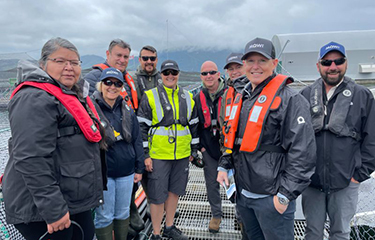Mowi remains committed to opposing Norway’s recently imposed aquaculture resource rent tax, according to CEO Ivan Vindheim.
Delivering an otherwise bullish presentation on Mowi’s Q2 2023 results in Oslo, Norway, on 23 August, Vindheim voiced the company’s disappointment with the parliament’s decision, saying it has already proved costly, with investments worth NOK 40 billion (USD 3.7 billion, EUR 3.5 billion) across the industry now on hold due to the tax.
Vindheim said that Mowi hasn’t given up on undoing the tax, which he called a “last-minute compromise with the least possible majority.” Vindheim said he hopes to influence Norway’s 2025 elections, which he hopes will result in a “new government with a more business-friendly policy.”
The company will also pursue legal lines of opposition in due course, according to Vindheim.
The 25 percent tax on salmon farming, made effective at the beginning of 2023 and applicable to the seawater growth phase, levies a marginal 47 percent tax when added to corporate taxes on Mowi and other large salmon-farming firms. The tax is solely applicable to a portion of the value chain – mainly the biomass in sea cages – so in response, Bergen, Norway-headquartered Mowi is currently running a tax optimization project to mitigate its impacts.
Pending this work and the final details from the authorities on the tax’s regulations, Mowi CFO Kristian Ellingsen said it’s “highly uncertain” what effect it will have on H1 earnings overall. As such, the company did not include an estimate in its Q2 results. However, Ellingsen said the underlying impact of the resource tax on earnings per share reached EUR 0.06 (USD 0.07) in Q2.
Despite the tax, a strong market and solid operational performance in all business areas helped Mowi haul in an all-time high quarterly revenue of …
Photo courtesy of Mowi








